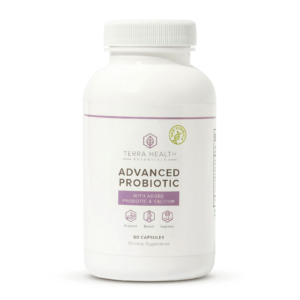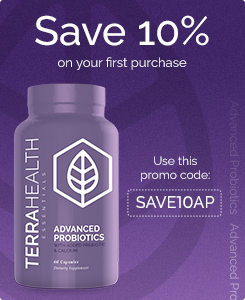There’s still a lot we don’t know about probiotics, but what we do know is that the research so far has been delivering promising results. The term “probiotics” translates into “for life”. This makes sense when you refer to how the World Health Organization defines this popular supplement. The WHO defines probiotics as “live microorganisms, which, when administered in adequate amounts, confer a health benefit on the host”. To sum that up, probiotics are live bacteria that help to keep us healthy. But let’s delve into that a little more.
 Our bodies are inhabited by trillions of bacteria called the human microbiome (and they’re not even paying rent!). Our bodies contain both good and bad bacteria, but probiotics help us grow more of the good kind and prevent bad bacteria from overpopulating. That’s a lot of bacteria, and it actually takes up about 4 pounds of your body weight! But, we’re lucky those good bacteria are there and it’s super important to ensure they stay in good supply. Why? Well, when your digestive system finds it hard to digest specific foods, your microbes will help out. They also play a massive role in supporting a healthy immune system and producing essential vitamins in your body.
Our bodies are inhabited by trillions of bacteria called the human microbiome (and they’re not even paying rent!). Our bodies contain both good and bad bacteria, but probiotics help us grow more of the good kind and prevent bad bacteria from overpopulating. That’s a lot of bacteria, and it actually takes up about 4 pounds of your body weight! But, we’re lucky those good bacteria are there and it’s super important to ensure they stay in good supply. Why? Well, when your digestive system finds it hard to digest specific foods, your microbes will help out. They also play a massive role in supporting a healthy immune system and producing essential vitamins in your body.
Rise in Probiotics
Many studies have investigated the role of gut bacteria in a number of diseases including IBS and mental health issues. The results of these studies suggest that we need to manage our microbiome in order to maintain optimal health, however many of us are lacking in these essential microorganisms because of our modern processed food diets, stress, and antibiotic usage. This has led to an influx of probiotic supplements and the welcome promotion of a diet that includes more probiotic-rich foods. Probiotics are so popular now that global sales have reached over $40 billion in 2019 . These sales expected to continue to grow.
Let’s look at some key cases where probiotics have proven to be beneficial.
 Antibiotics and Probiotics (AKA Batman and Robin!)
Antibiotics and Probiotics (AKA Batman and Robin!)
I’m sure that your doctor or pharmacist has at some stage recommended a course of probiotics if you’ve been taking antibiotics for an illness. This promotes the buildup of good bacteria in your gut that these medications often annihilate. Obviously, if you’re unwell and your physician prescribes antibiotics, then it is vital that you follow their instructions. But supplementing with a probiotic makes sure you have a Batman and Robin type tag team so that you get well and your gut is protected too.
IBS Symptom Management
Studies have shown that probiotics can help with the symptoms of IBS such as diarrhea, abdominal pain, constipation, and bloating. In a 2014 published by the American Journal of Gastroenterology, it was also determined that probiotics can help to relieve IBS symptoms. The study also noted that up to 16% of people in the US reported that taking probiotics alleviated their IBS issues.
IBS is very person-specific and what works for one person may not work for the other. If probiotics are not working for your IBS don’t get disheartened as there may be another solution. For example, many of our own customers combine a digestive aid enzyme supplement with their probiotics to help their bodies to successfully break down food and reduce flatulence and cramping.
 Mental Health and The Gut-Brain Connection
Mental Health and The Gut-Brain Connection
It’s no coincidence that you can get a queasy stomach right before an important presentation or a loss of appetite when you’re experiencing stress. This is all connected to your gut’s microbiome and is known as the gut-brain axis – i.e. it’s your brain talking to your gut microbiome! What’s even more interesting is that this also works the other way around and your gut microbiome can talk to your brain too!
This research has led to further studies showing that supplementing with probiotics may actually improve your cognitive functioning and your mood. Psychiatry professor Aparana Iyer believes that probiotics will play a significant role in the future treatment of mental health;
“I can foresee more widespread usage of probiotics in the treatment of mental health, especially since most people can tolerate them well,” – Aparna Iyer, MD, assistant professor of psychiatry, University of Texas Southwestern Medical Center.
Other Conditions Probiotics Can Help You With
In addition to the above conditions, probiotics can also help with the treatment and prevention of many inflammatory conditions of the digestive tract such as Crohn’s disease. They can also help to treat constipation, acid reflux, diarrhea, insomnia, stiff joints, and lactose intolerance.
 If You’re Going to Do Something, Do it Right
If You’re Going to Do Something, Do it Right
In order for probiotics to work for you, it’s important that you take them correctly and follow the directions on the label. One of the biggest mistakes people make is that they don’t take their probiotics with food. This usually happens when they’re skipping breakfast and running out the door with a bottle of water in the morning, but it’s really not the optimal way to ingest probiotics.
A study in 2011 found that it’s best to take a probiotic either with food or 30 minutes beforehand in order to gain all of the benefits of the supplement. If your regular dose of probiotics isn’t working for you, don’t be afraid to increase your intake a little to see if it makes a difference, particularly if you’re fighting an illness. You can always go back down to your normal intake amount once you’re back to optimal health.
You should also increase your intake of probiotic-rich foods such as soy drinks, some fruit juices, milk, soft cheeses, kimchi, pickles, and of course – the most well-known of them all – yogurt!
Remember, probiotics aren’t a magic pills and they don’t work overnight, so try to be patient whilst waiting to see the results of your new supplement/dietary regime. Probiotic supplements support your overall health and well-being. If you’re generally healthy, probiotics will help to improve and sustain your immune and health long-term, whereas those with digestive issues should see results within a few weeks.
 Order Your Advanced Probiotics Now
Order Your Advanced Probiotics Now
It’s never too late to start looking after your health and we’re here to help you every step of the way. That’s why Terra Health Essentials Advanced Probiotics are now available to our readers at a 30% discount!
To avail of this special discount, please use the code terraprobiotics30 when ordering.

